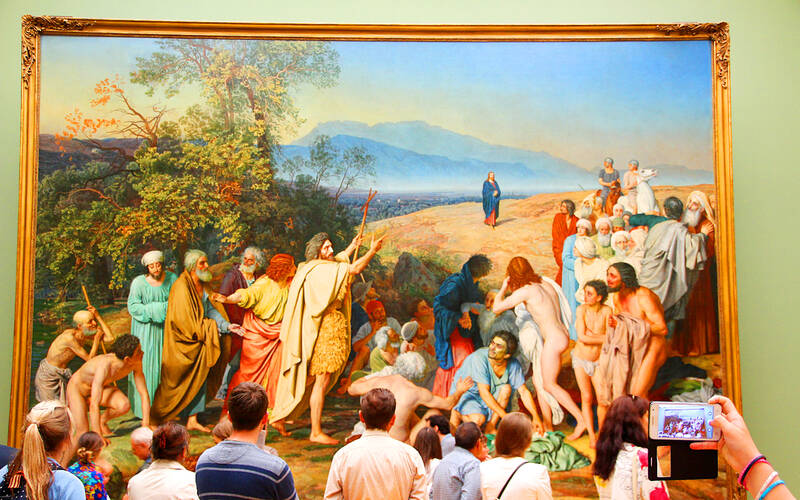對話 Dialogue
清清:華華,你喜歡不喜歡看畫展?
Qīngqing: Huáhua, nǐ xǐhuān bù xǐhuān kàn huàzhǎn?

Photo courtesy of Hippopx 照片:Hippopx 提供
華華:喜歡啊!尤其現在這麼熱,到美術館或是博物館看畫展,又安靜又舒服,是個放鬆的好辦法。
Huáhua: Xǐhuān a! Yóuqí xiànzài zhème rè, dào měishùguǎn huò shì bówùguǎn kàn huàzhǎn, yòu ānjìng yòu shūfú, shì ge fàngsōng de hǎo bànfǎ.
清清:我剛發現在台北的富邦美術館展出來自荷蘭梵谷的真跡,在台南的奇美博物館也正舉辦英國國家藝廊珍藏展,可以一覽歐洲好幾位大師的名畫。
Qīngqing: Wǒ gāng fāxiàn zài Táiběi de Fùbāng Měishùguǎn zhǎnchū lái zì Hélán Fàngǔ de zhēnjī, zài Táinán de Qíměi Bówùguǎn yě zhèng jǔbàn Yīngguó Guójiā Yìláng zhēncángzhǎn, kěyǐ yìlǎn Ōuzhōu hǎojǐ wèi dàshī de mínghuà.
華華:這也太幸福了吧!我都不知道原來你也喜歡繪畫呢!
Huáhua: Zhè yě tài xìngfú le ba! Wǒ dōu bù zhīdào yuánlái nǐ yě xǐhuān huìhuà ne!
清清:我就喜歡梵谷,你呢?你最喜歡哪位畫家?
Qīngqing: Wǒ jiù xǐhuān Fàngǔ, nǐ ne? Nǐ zuì xǐhuān něi wèi huàjiā?
華華:要說喜歡哪位畫家,倒不如說我最喜歡的風格是巴洛克和印象派這兩種。
Huáhua: Yàoshuō xǐhuān něi wèi huàjiā, dào bùrú shuō wǒ zuì xǐhuān de fēnggé shì Bāluòkè hàn Yìnxiàngpài zhè liǎng zhǒng.
清清:那就太剛好了,你快走一趟奇美博物館,那裡能滿足你全部的喜好。
Qīngqing: Nà jiù tài gānghǎo le, nǐ kuài zǒu yí tàng Qíměi Bówùguǎn, nàlǐ néng mǎnzú nǐ quánbù de xǐhào.
華華:謝謝你告訴我,需要的話,我可以先陪你去台北看梵谷,再去台南心靈充電喔!
Huáhua: Xièxie nǐ gàosù wǒ, xūyào dehuà, wǒ kěyǐ xiān péi nǐ qù Táiběi kàn Fàngǔ, zài qù Táinán xīnlíng chōngdiàn o!
翻譯 Translation
Qingqing: Huahua, do you like going to art exhibitions?
Huahua: Yes, I do. Especially now that it’s so hot, going to an art gallery or museum to see an exhibition is quiet and comfortable, a great way to relax.
Qingqing: I just found out that the Fubon Art Gallery in Taipei is exhibiting original works by Van Gogh from the Netherlands, and the Chimei Museum in Tainan is hosting a British National Gallery exhibition, showcasing masterpieces by several European masters.
Huahua: That’s great. I didn’t know you were also interested in painting.
Qingqing: I really like Van Gogh. What about you? Who’s your favorite artist?
Huahua: Instead of naming a favorite artist, I would say my favorite styles are Baroque and Impressionism.
Qingqing: That’s perfect. You should definitely visit the Chimei Museum; it will satisfy all your preferences.
Huahua: Thanks for the heads up. If you want, I can go with you to Taipei to see Van Gogh first, and then we can head to Tainan for a soul recharge.
生詞 Vocabulary
1. 美術館 (měishùguǎn) art gallery, art museum
2. 畫展 (huàzhǎn) art exhibition
3. 梵谷 (Fàngǔ) Van Gogh
4. 真跡 (zhēnjī) original work, authentic work
5. 珍藏 (zhēncáng) treasures, collections
6. 繪畫 (huìhuà) painting
7. 心靈 (xīnlíng) mind, soul
8.充電 (chōngdiàn) recharge
教材音檔 Audio Files
國立清華大學華語中心提供
By National Tsing Hua University Chinese Language Center:

In an effort to fight phone scams, British mobile phone company O2 has introduced Daisy, an AI designed to engage phone con artists in time-wasting conversations. Daisy is portrayed as a kindly British granny, exploiting scammers’ tendency to target the elderly. Her voice, based on a real grandmother’s for authenticity, adds to her credibility in the role. “O2” has distributed several dedicated phone numbers online to direct scammers to Daisy instead of actual customers. When Daisy receives a call, she translates the scammers’ spoken words into text and then responds to them accordingly through a text-to-speech system. Remarkably, Daisy

Bilingual Story is a fictionalized account. 雙語故事部分內容純屬虛構。 Emma had reviewed 41 resumes that morning. While the ATS screened out 288 unqualified, she screened for AI slop. She could spot it a mile away. She muttered AI buzzwords like curses under her breath. “Team player.” “Results-driven.” “Stakeholder alignment.” “Leveraging core competencies.” Each resume reeked of AI modeling: a cemetery of cliches, tombstones of personality. AI wasn’t just changing hiring. It was draining the humanity from it. Then she found it: a plain PDF cover letter. No template. No design flourishes. The first line read: “I once tried to automate my

Every May 1, Hawaii comes alive with Lei Day, a festival celebrating the rich culture and spirit of the islands. Initiated in 1927 by the poet Don Blanding, Lei Day began as a tribute to the Hawaiian custom of making and wearing leis. The idea was quickly adopted and officially recognized as a holiday in 1929, and leis have since become a symbol of local pride and cultural preservation. In Hawaiian culture, leis are more than decorative garlands made from flowers, shells or feathers. For Hawaiians, giving a lei is as natural as saying “aloha.” It shows love and

1. 他走出門,左右看一下,就過了馬路。 ˇ He walked outside, looked left and right, and crossed the road. χ He walked outside and looked left and right, crossed the road. 註︰並列連接詞 and 在這句中連接三個述語。一般的結構是 x, y, and z。x and y and z 是加強語氣的結構,x and y, z 則不可以。 2. 他們知道自己的弱點以及如何趕上其他競爭者。 ˇ They saw where their weak points lay and how they could catch up with the other competitors. χ They saw where their weak points lay and how to catch up with the other competitors. 註:and 一般連接同等成分,結構相等的單詞、片語或子句。誤句中 and 的前面是子句,後面是不定詞片語,不能用 and 連接,必須把不定詞片語改為子句,and 前後的結構才相等。 3. 她坐上計程車,直接到機場。 ˇ She took a cab, which took her straight to the airport. ˇ She took a cab and it took her straight